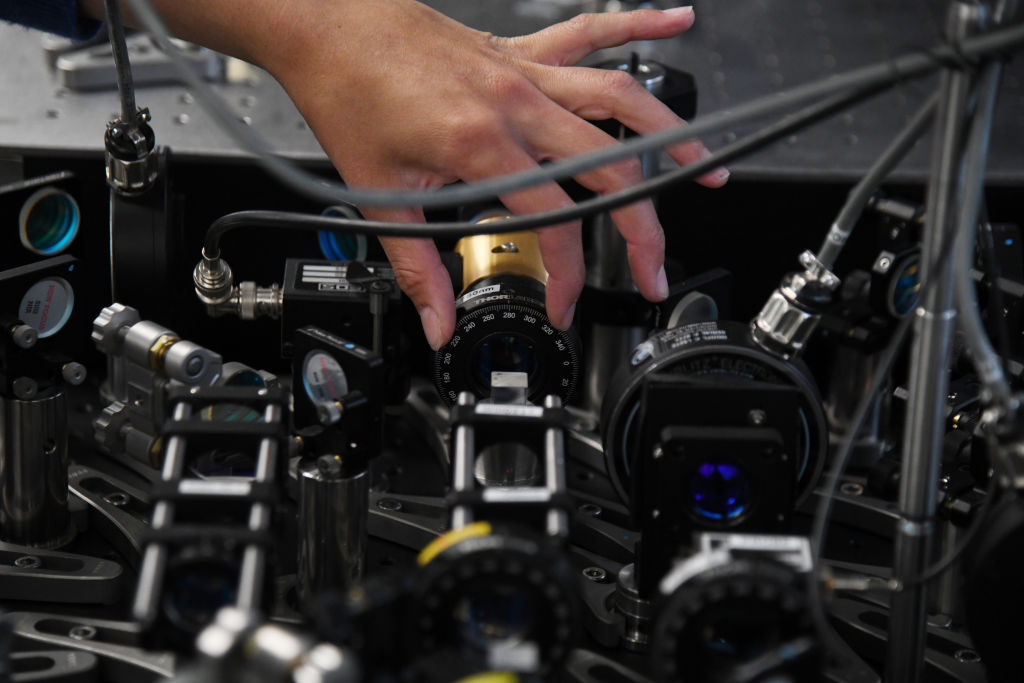Australia should invest in a home-grown quantum industry

The recently announced AUKUS technology-sharing pact is about much more than the United Kingdom and United States helping Australia get nuclear-powered submarines; it is an agreement to share platforms and innovation costs for advanced technologies like artificial intelligence and quantum computing. Much of America’s rapidly expanding quantum sector has been fuelled by Australian discoveries and research. But the agreement highlights that, rather than be an intellectual supplier to the US, Australia needs to initiate a strategic investment in quantum technology as a national priority.
In 2001, a discovery made by three physicists, one an Australian, provided a radical new way to build quantum computers using light. Two decades later, two world-leading quantum computing companies—built on principles of this theory and led by Australians—have a valuation of well over US$3 billion.
But neither is based in Australia. PsiQuantum is based in Silicon Valley and Xanadu is based in Toronto. Other Australians have gone on to lead quantum computer development teams in public companies like IBM and Google—but again, overseas. Despite Australia’s continued prominence in quantum research, when it comes to capitalising on the ideas domestically, we come up short.
The impact of quantum computing, quantum communications and other quantum-enabled technologies is world-changing. Quantum computers can solve a panoply of problems for tasks like synthesising new drugs, managing supply chains and cracking public key cryptography. Meanwhile, quantum cryptography promises uncrackable encryption and quantum sensors can be used for mineral exploration, medical diagnostics and navigation.
Throughout the Covid-19-induced economic downturn, major world economies have escalated their investment in quantum in a global arms race, of sorts. In 2020, the US Congress passed the National Quantum Initiative Act, which injects another US$1 billion into the country’s already multibillion-dollar investment in the advancement of quantum technologies. Several EU nations are making similar scale investments.
However, by far the biggest state actor is China, which has flagged an investment of more than $13 billion to establish a four-hectare quantum technology centre in Hefei, and has made major advancements in the field in recent years, including secure communications mediated using satellite-based quantum cryptography.
Aside from major financial investments, 17 countries have now adopted coordinated national quantum strategies and another three have quantum strategies in development.
While Australia played a highly influential role in the early development of quantum technologies, today we are witnessing a significant flight of intellectual capital to more fertile jurisdictions overseas. Exacerbating this situation is the slow rollout of Covid vaccines accompanied with strict border controls, which has accelerated Australia’s technology talent leak.
Before 2015, we ranked sixth in sovereign investment among the nine largest economies actively investing in quantum technology. Today, we’re ranked last. And, Australia has no coordinated national quantum strategy to speak of. Of course, Australia can’t directly compete with the US or China in terms of capital investment and infrastructure for quantum. But we can nurture the advancement of our place in the global quantum ecosystem in a manner that matches our national strategic interests—the same approach that we, and other medium-sized economies, use in existing areas of defence and strategic policy.
Quantum technology will be one of the most strategically valuable sectors in the coming decades, but it needs entrepreneurs and resources to thrive. Australia enjoys a well-educated workforce, a uniquely attractive natural environment and a welcoming culture with a high standard of living. These are prime conditions to build a knowledge-based economy. But what’s lacking is an investment culture and federal policy committed to support this technology.
In a recent policy report published by ASPI’s International Cyber Policy Centre, we provide a roadmap for establishing a national quantum technologies initiative to develop a home-grown quantum industry.
This should be a whole-of-government initiative with a dedicated minister for critical and emerging technologies working across the relevant economic, national security, industry, research, defence and science agencies in the public sector.
The Australian government should also immediately lay the groundwork for a post-Covid multibillion-dollar technology stimulus that should include a significant fraction targeted to quantum technologies. The stimulus would be a game-changer for Australia and help the country diversify and deepen its technological and research and development base.
We also argued that an Australian ‘distributed quantum zone’ should be established to create a competitive commercial environment for developing quantum hardware and software through tax and regulatory incentives, infrastructure and training, and to attract foreign direct investment.
Australia sits at a point in its history where our economic strength is heavily reliant on industries that are in decline. The fourth industrial revolution will require shifting to a more knowledge-based economy, employing intellectual capital. This is an area in which Australia already has a competitive advantage. The government says it wants advanced development and manufacturing industries to emerge in Australia and the AUKUS agreement is an important step in that direction. But first we need to build up the right ecosystem, and that involves giving technologists, inventors and entrepreneurs a reason to base themselves here.